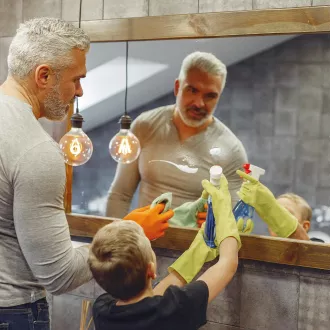Transcription Benefits of allowing children to take care of their personal hygiene
Personal hygiene is an important aspect of daily life that not only helps maintain physical health, but also contributes to good mental health and self-esteem. Independence in personal hygiene is an important step in a child's development and it can be a challenge for parents and caregivers to help children learn to care for themselves.
In this article, we will discuss the benefits of allowing children to take care of their personal hygiene, how to help without doing all the work, how to teach care and maintenance of personal items, how to encourage responsibility in personal hygiene, how to encourage safety and risk prevention, the appropriate age to begin encouraging independence in personal hygiene, teaching personal hygiene skills, and the importance of personal hygiene in child autonomy. In addition, possible challenges and solutions that this brings will be explored.
Self-care is an important skill for child development. Encouraging independence in personal hygiene has many benefits, such as helping children develop skills of self-control, self-esteem, independence and responsibility. Children who learn to take care of their personal hygiene are more likely to take care of their overall health and have higher self-esteem. In addition, allowing children to take care of their personal hygiene helps them develop social and emotional skills, such as empathy and the ability to care for others.
Promotes independence and self-esteem.
One of the most important reasons for allowing children to take care of their own personal hygiene is that it helps them develop a sense of independence. When children are able to take care of themselves and their basic needs, such as brushing their teeth or washing their hands, they feel more capable and confident. This can help them develop greater self-esteem and feel more confident in their ability to meet the challenges they face.
Encourage responsibility and maturity.
Allowing children to take care of their own personal hygiene also helps them develop a sense of maturity. When given the responsibility to take care of themselves, children learn that their actions have consequences. If they don't brush their teeth, for example, they can develop tooth decay. If they don't wash their hands, they can get sick or spread germs to others. Learning to care for themselves and others in this way can help them develop a sense of responsibility and become more mature adults.
Promotes positive self-image
Taking care of their own personal hygiene can also help children develop a positive self-image. When they look clean and well-groomed, they may feel more comfortable with themselves and others. In addition, by learning to take care of their bodies, children may feel that they are doing something important and meaningful, which can improve their self-image.
Promotes physical health
Of course, one of the most obvious benefits of allowing children to take care of their own personal hygiene is that it can help them maintain good physical health. Teaching children to brush their teeth, wash their hands and bathe regularly can help prevent illness and keep them healthy. Taking care of their physical image involves everything from personal hygiene to their projection as an individual to the society in which they live. They need to understand how beneficial it is to have a body free of dirt and contagious diseases.
Promotes mental health
In addition to promoting physical health, taking care of their own personal hygiene can also have benefits for children's mental health. Mental health is the primary result of body self-recognition and acceptance. Being content with our physical representation contributes to good self-esteem in psychological aspects and the ability to resolve internal conflicts. Dissatisfaction with physical capacities affects the level of emotional relationships of children with their peers and their environment.
benefits hygiene staff




